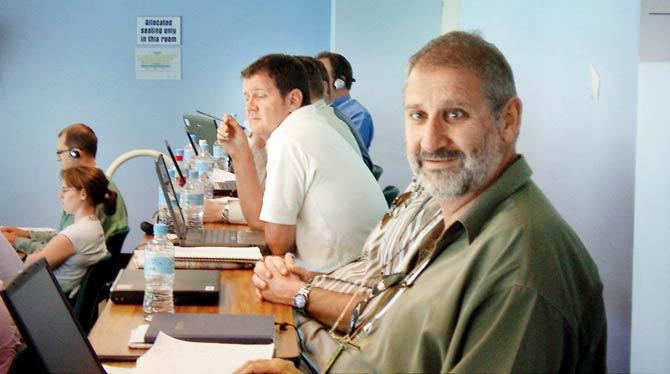Journalist who pushed for more cricket between Australia and India thoroughly deserves the ‘Member of the Order of Australia’ honour

 It’s celebration time in the journalistic fraternity of world cricket as Australian writer Mike Coward becomes a ‘Member of the Order of Australia.’ It is an honour conferred, according to the Australian government website, “for service in a particular locality or field of activity or to a particular group.” Coward’s contribution to cricket writing, broadcasting and authoring has been exemplary.
It’s celebration time in the journalistic fraternity of world cricket as Australian writer Mike Coward becomes a ‘Member of the Order of Australia.’ It is an honour conferred, according to the Australian government website, “for service in a particular locality or field of activity or to a particular group.” Coward’s contribution to cricket writing, broadcasting and authoring has been exemplary.
ADVERTISEMENT
To say that Coward has been a senior, respected pro is as obvious as saying Greg Chappell was a master batting technician; his brother Ian a fine captain; Doug Walters an entertaining batsman and Dennis Lillee a menacing fast bowler.

Mike Coward at his desk in the Sydney Cricket Ground press box
All these names played at a time when Coward went from strength to strength in cricket writing. Over the last eight years, he has made less use of his pen and focussed his energies on enriching the International Cricket Hall of Fame in Don Bradman’s hometown Bowral through his on-screen interviews with some of the game’s best names.
Coward has a close bond with India. In the late 1980s, he wrote a good part of his famous book Cricket Beyond the Bazaar — Australia on the Indian subcontinent in the outskirts of Chennai, his favourite city where he reported on the 1986 Tied Test and the thrilling India vs Australia 1987 World Cup game. Since then, he has visited India often. Each visit stressful but fruitful, every return journey filled with the satisfaction of having reunited with old friends.
India and Australia play more often now than in earlier years and Coward has played a part in that change. Having reported on the 1986 Tied Test, Coward recognised that the rivalry between these two cricketing giants could help the game immensely. There was a
10-year gap between the 1969-70 and 1979-80 Test series in India. It took another seven years for both countries to play Test cricket in India and another 10 years for the next Test, by which time the Border-Gavaskar Trophy was initiated.
Coward pushed for more cricket exchanges through his writing. There was absolutely no cynicism displayed by him when it came to India. As Sunil Gavaskar wrote in his foreword to Cricket Beyond the Bazaar in 1990: “It is people
like Allan Border and Mike Coward who will vouch for the fact that nowhere else in the world is cricket so much a way of life as it is on the subcontinent.”
In Cricket Beyond the Bazaar, Coward’s description of Dean Jones’ return to the Chidambaram Stadium dressing room, after scoring probably the most painful Test double century in the history of the game, is profound: “I was behind the steel mesh of the communications cage at the rear of the players’ viewing area when Jones made his agonisingly unsteady return to the dressing room. Not since I stood close to those who trailed American Frank Shorter into the Munich stadium at the end of the marathon at the 20th Olympiad had I seen a sportsman so distressed. His pupils were dilated, his lips swollen, his face red and his whole body weak and racked with pain.”
Of course, Coward’s work goes beyond the sub-continental canvass. Like the late Tony Cozier, he wrote and spoke on air and did the sweaty yards to write and despatch reports on tight deadlines. At one time, he reported on every Australia match from August 1984 to March 1989.
Coward shared press box space with some great writers like Jack Fingleton, Bill O’Reilly, Ray Robinson, Peter Roebuck and our very own KN Prabhu, but he’d make even the junior-most of cricket correspondents comfortable. And if you happened to be in Sydney at the time, he’d always invite you for his customary Sydney Test party at his Annandale home.
Coward is currently celebrating his ‘Member of the Order of Australia’ and the build-up to his 70th birthday in Europe. He told me yesterday, “As Gideon Haigh (cricket historian) said, it is an award that is ‘good for the trade.’ I very much hope this is so. One of the joys of the past week was fielding nearly 200 calls, texts, emails and notes from colleagues and friends throughout the world of cricket and journalism. And this included calls from India which especially meant a lot to me.”
And while Coward enjoys his glass of white wine on his European holiday, he’ll turn back the clock to the 1950s when it all began for him - writing ‘reports’ on his return from childhood football matches on his mother’s old typewriter and using a broken torch as a microphone ‘commentating’ on street games. And of course to 1963, when he began as a copy boy at the Adelaide News.
mid-day’s group sports editor Clayton Murzello is a purist with an open stance. He tweets @ClaytonMurzello. Send your feedback to [email protected]
 Subscribe today by clicking the link and stay updated with the latest news!" Click here!
Subscribe today by clicking the link and stay updated with the latest news!" Click here!






